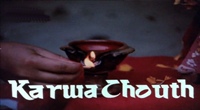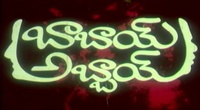The Cabinet of Dr. Caligari (German: Das Cabinet des Dr. Caligari) is a 1920 German silent horror film, directed by Robert Wiene and written by Hans Janowitz and Carl Mayer. Considered the quintessential work of German Expressionist cinema, it tells the story of an insane hypnotist (Werner Krauss) who uses a somnambulist (Conrad Veidt) to commit murders. The film features a dark and striking visual style, with sharp-pointed forms, oblique and curving lines, structures and landscapes that lean and twist in unusual angles, and shadows and streaks of light painted directly onto the sets.
| The Cabinet of Dr. Caligari | |
|---|---|
Theatrical release poster | |
| Directed by | Robert Wiene |
| Produced by |
|
| Written by |
|
| Starring |
|
| Music by | Giuseppe Becce |
| Cinematography | Willy Hameister |
| Distributed by | Decla-Bioscop |
Release date |
|
Running time | 74 minutes |
| Country | Weimar Republic |
| Language | Silent film German intertitles |
The script was inspired by various experiences from the lives of Janowitz and Mayer, both pacifists who were left distrustful of authority after their experiences with the military during World War I. The film's design was handled by Hermann Warm, Walter Reimann and Walter Röhrig, who recommended a fantastic, graphic style over a naturalistic one. The film has been characterized as presenting themes on brutal and irrational authority; the destabilized contrast between insanity and sanity; the subjective perception of reality; and the duality of human nature.
The Cabinet of Dr. Caligari was released just as foreign film industries were easing restrictions on the import of German films following World War I, so it was screened internationally. Accounts differ as to its financial and critical success upon release, but modern film critics and historians have largely praised it as a revolutionary film. Critic Roger Ebert called it arguably "the first true horror film", and film reviewer Danny Peary called it cinema's first cult film and a precursor to arthouse films. Considered a classic, it helped draw worldwide attention to the artistic merit of German cinema and had a major influence on American films, particularly in the genres of horror and film noir, introducing techniques such as the twist ending and the unreliable narrator to the language of narrative film.
Screenplay
As Francis (Friedrich Feher) sits on a bench with an older man who complains that spirits have driven him away from his family and home, a dazed woman named Jane (Lil Dagover) passes them. Francis explains she is his "fiancée" and that they have suffered a great ordeal. Most of the rest of the film is a flashback of Francis' story, which takes place in Holstenwall, a shadowy village of twisted buildings and spiraling streets. Francis and his friend Alan (Hans Heinrich von Twardowski), who are good-naturedly competing for Jane's affections, plan to visit the town fair. Meanwhile, a mysterious man named Dr. Caligari (Werner Krauss) seeks a permit from the rude town clerk to present a spectacle at the fair, which features a somnambulist named Cesare (Conrad Veidt). The clerk mocks and berates Dr. Caligari, but ultimately approves the permit. That night, the clerk is found stabbed to death in his bed.
The next morning, Francis and Alan visit Dr. Caligari's spectacle, where he opens a coffin-like box to reveal the sleeping Cesare. Upon Dr. Caligari's orders, Cesare awakens and answers questions from the audience. Despite Francis's protests, Alan asks, "How long will I live?" To Alan's horror, Cesare answers, "Until dawn." Later that night, a figure breaks into Alan's home and stabs him to death in his bed. A grief-stricken Francis investigates Alan's murder with help from Jane and her father, Dr. Olsen (Rudolf Lettinger), who obtains police authorization to investigate the somnambulist. That night, the police apprehend a criminal in possession of a knife (Rudolf Klein-Rogge) who is caught attempting to murder an elderly woman. When questioned by Francis and Dr. Olson, the criminal confesses he tried to kill the elderly woman, but denies any part in the two previous deaths; he was merely taking advantage of the situation to divert blame onto the real murderer.
At night, Francis spies on Dr. Caligari and observes what appears to be Cesare sleeping in his box. However, the real Cesare sneaks into Jane's home as she sleeps. He raises a knife to stab her, but instead abducts her after a struggle, dragging her through the window onto the street. Chased by an angry mob, Cesare eventually drops Jane and flees; he soon collapses and dies. Francis also confirms that the caught criminal has been locked away and could not have been the attacker. Francis and the police investigate Dr. Caligari's sideshow and realize that the 'Cesare' sleeping in the box is only a dummy. Dr. Caligari escapes in the confusion. Francis follows and sees Caligari go through the entrance of an insane asylum.
Upon further investigation, Francis is shocked to learn that Dr. Caligari is the asylum's director. With help from the asylum staff, Francis studies the director's records and diary while the director is sleeping. The writings reveal his obsession with the story of an 18th-century mystic named Caligari, who used a somnambulist named Cesare to commit murders in northern Italian towns. The director, attempting to understand the earlier Caligari, experiments on a somnambulist admitted to the asylum, who becomes his Cesare. The director screams, "I must become Caligari!" Francis and the doctors call the police to Dr. Caligari's office, where they show him Cesare's corpse. Dr. Caligari then attacks one of the staff. He is subdued, restrained in a straitjacket, and becomes an inmate in his own asylum.
The narrative returns to the present, where Francis concludes his story. In a twist ending, Francis is depicted as an asylum inmate. Jane and Cesare are patients as well; Jane believes she is a queen, while Cesare is not a somnambulist but awake, quiet, and not visibly dangerous. The man Francis considers as "Dr. Caligari" is the asylum director. Francis attacks him and is restrained in a straitjacket, then placed in the same cell where Dr. Caligari was confined in Francis' story. The director announces that now he understands Francis' delusion. As such, he is confident he can cure him.
- Werner Krauss as Dr. Caligari
- Conrad Veidt as Cesare
- Friedrich Feher as Francis
- Lil Dagover as Jane
- Hans Heinrich von Twardowski as Alan
- Rudolf Lettinger as Dr. Olsen
- Hans Lanser-Ludolff as Old Man on Bench
- Rudolf Klein-Rogge as Man with a Knife
- Henri Peters-Arnolds as Young Doctor
- Ludwig Rex as Criminal
- Elsa Wagner as Landlady
Writing
The Cabinet of Dr. Caligari was written by Hans Janowitz and Carl Mayer, both of whom were pacifists by the time they met following World War I. Janowitz served as an officer during the war, but the experience left him embittered with the military, which affected his writing. Mayer feigned madness to avoid military service during the war, which led him to intense examinations from a military psychiatrist. The experience left him distrustful of authority, and the psychiatrist served as a model for the Dr. Caligari character. Janowitz and Mayer were introduced in June 1918 by a mutual friend, actor Ernst Deutsch. Both writers were penniless at the time. Gilda Langer, an actress with whom Mayer was in love, encouraged Janowitz and Mayer to write a film together. She later became the basis for the Jane character. Langer also encouraged Janowitz to visit a fortune teller, who predicted that Janowitz would survive his military service during the war, but Langer would die. This prediction proved true, as Langer died unexpectedly in 1920 at age 23, and Janowitz said it inspired the scene in which Cesare predicts Alan's death at the fair.
Although neither had any associations with the film industry, Janowitz and Mayer wrote a script over six weeks during the winter of 1918–19. In describing their roles, Janowitz called himself "the father who planted the seed, and Mayer the mother who conceived and ripened it". The Expressionist filmmaker Paul Wegener was among their influences. The story was partially inspired by a circus sideshow the two visited on Kantstrasse in Berlin, called "Man or Machine?", in which a man performed feats of great strength after becoming hypnotized. They first visualized the story of Caligari the night of that show. Several of Janowitz's past experiences influenced his writing, including memories of his hometown of Prague, and, as he put it, a mistrust of "the authoritative power of an inhuman state gone mad" due to his military service. Janowitz also believed he had witnessed a murder in 1913 near an amusement park on Hamburg's Reeperbahn, beside the Holstenwall, which served as another inspiration for the script. According to Janowitz, he observed a woman disappear into some bushes, from which a respectable-looking man emerged a few moments later, and the next day Janowitz learned the girl was murdered. Holstenwall later became the name of the town setting in Caligari.
Janowitz and Mayer are said to have set out to write a story denouncing arbitrary authority as brutal and insane. Janowitz said it was only years after the film was released that he realized exposing the "authoritative power of an inhuman state" was the "subconscious intention" of the writers. However, Hermann Warm, who designed the film's sets, said Mayer had no political intentions when he wrote the film. Film historian David Robinson noted Janowitz did not refer to anti-authority intentions in the script until many decades after Caligari was released, and he suggested Janowitz's recollection may have changed in response to later interpretations to the film. The film they wrote was entitled Das Cabinet des Dr. Caligari, using the English spelling "Cabinet" rather than the German "Kabinett". The completed script contained 141 scenes. Janowitz has claimed the name "Caligari", which was not settled upon until after the script was finished, was inspired by a rare book called ‘’Unknown Letters of Stendhal'’, which featured a letter from the French novelist Stendhal referring to a French officer named Caligari he met at the La Scala theatre in Milan. However, no record of any such letter exists, and film historian John D. Barlow suggested Janowitz may have fabricated the story. The physical appearance of Dr. Caligari was inspired by portraits of the German philosopher Arthur Schopenhauer. The character's name is spelled "Calligaris" in the only known surviving script, although in some instances the final "s" is removed. Other character names are also spelled differently from the final film: Cesare appears as "Caesare", Alan is "Allan" or sometimes "Alland" and Dr. Olfen is "Dr. Olfens". Likewise, unnamed characters in the final film have names in the script, including the town clerk ("Dr. Lüders") and the house-breaker ("Jakob Straat").
The story of Caligari is told abstractly, like a fairy tale, and includes little description about or attention toward the psychological motivations of the characters, which is more heavily emphasized in the film's visual style. The original script shows few traces of the Expressionist influence prevalent in the film's sets and costumes. Through film director Fritz Lang, Janowitz and Mayer met with Erich Pommer, head of production at the Decla-Bioscop film studio, on 19 April 1919, to discuss selling the script. According to Pommer, he attempted to get rid of them, but they persisted until he agreed to meet with them. Pommer reportedly asked the writers to leave the script with him, but they refused, and instea
Watch movie The Cabinet Of Dr. Caligari 1920 Film online on Amazon
Watch movie The Cabinet Of Dr. Caligari 1920 Film online
Watch The Movie On PrimeLal Dupatta Malmal Ka Full HD Movie Download

Naagmani Full HD Movie Download

Kabzaa-The Mafia Raaj Full HD Movie Download

Masti Full HD Movie Download

Accident Full HD Movie Download

Half Ticket Full HD Movie Download

Karwa Chouth Full HD Movie Download

Stop! Full HD Movie Download

Bengal Tiger Full HD Movie Download

Gauri-The Unborn Full HD Movie Download

Sikandar (2009) Full HD Movie Download
.jpg)
Teri Talash Mein (1990) Full HD Movie Download
.jpg)
Raajadaani Full HD Movie Download

8 Million Dollars Full HD Movie Download

Babbi Abbai Full HD Movie Download

Sati Sukanya Full HD Movie Download

Bharatamlo Arjunudu Full HD Movie Download

Muddulu Priyudu Full HD Movie Download

Sree Lekha Full HD Movie Download

Andha Bichar (Bengali) Full HD Movie Download
.jpg)
Dhoom Full HD Movie Download

Download latest Movie from bollywood
- 1> baaghi 3
- 2> THE SKY IS PINK MOVIE FULL STORY AND REVIEW
- 3> Luka Chuppi
- 4> TO ALL THE BOYS I’VE LOVED BEFORE
- 5> Kabir Singh
- 6> Street Dancer 3D
- 7> Simmba
- 8> Gone Girl
- 9> The Girl Who Lived
- 10> Ludo
- 11> DILWALE DULHANIA LE JAYENGE
- 12> GUILTY
- 13> The Godfather
- 14> Adventures of Rusty
- 15> Sooryavanshi
- 16> Satyameva Jayate 2
- 17> Thappad
- 18> Bhool Bhulaiyaa 2
- 19> KGFChapter 2
- 20> Mardaani 2
- 21> Pinjar
- 22> Shivaji maharaj
- 23> Ek Villian 2
- 24> Hungama 2
- 25> Divergent
- 26> Mumbai Saga
- 27> The Internship
- 28> HIT (telugu)
- 29> Panga
- 30> The perfect date
- 31> 16 December
- 32> Gopala Gopala (Telugu)
- 33> Brahmastra
- 34> Gangubai Kathiawadi
- 35> Manmadhudu
- 36> Nenu local
- 37> Mahanati
- 38> Shatamanam bavathi
- 39> Lagaan
- 40> After
- 41> MOM
- 42> Shamshera
- 43> Raguvaran BTech
- 44> Khakee
- 45> The villain
- 46> OM
- 47> Mr. perfect
- 48> Bueatifull mind
- 49> Hichki
- 50> Gabbar Singh
- 51> Jogi
- 52> Before Sunrise
- 53> Before Sunset
- 54> Before Midnight
- 55> The Big Bull
- 56> Top Gun: Maverick
- 57> The Purge
- 58> The Sky is Pink
- 59> Laxmmi Bomb
- 60> Sadak 2
- 61> Sufna
- 62> Prithviraj
- 63> PK
- 64> Coolie No 1(2020)
- 65> Black Widow
- 66> Dear Zindagi
- 67> Dil Bechara
- 68> PHIR HERA PHERI
- 69> WAR
- 70> Dostana
- 71> RRR: Roudram Ranam Rudhiram
- 72> Maidan
- 73> Dabbang 3
- 74> Chhalaang
- 75> life as we know it
- 76> SherShaah
- 77> Sandeep Aur Pinky Faraar
- 78> Event Horizon
- 79> 83
- 80> Radhe: Your Most Wanted Bhai
- 81> Gunjan Saxena: The Kargil Girl
- 82> Mr India
- 83> Vivah
- 84> Anokha Bandhan
- 85> Ghost
- 86> Bhoot: Part One - The Haunted Ship
- 87> Haseen Dilruba
- 88> Laal Singh Chaddha
- 89> Qismat
- 90> Rajput
- 91> Drive
- 92> Dil Chahta Hai
- 93> Dil Ki Baazi
- 94> Dil Ka Rishta
- 95> Teesri Manzil
- 96> Dil
- 97> Love Aaj Kal
- 98> Khaali Peeli
- 99> Bunty Aur Babli 2
- 100> Atrangi Re
- 101> Gulabo Sitabo
- 102> Jodi
- 103> Suraj Pe Mangal Bhari
- 104> Deewana
- 105> Attack
- 106> Sardar Udham Singh
- 107> Toofan
- 108> THE LOVEBIRDS
- 109> Jersey
- 110> Ginny Weds Sunny
- 111> Thalaivi
- 112> Shiddat
- 113> Angels vs Zombies
- 114> Koi Mil Gya
- 115> Thank God
- 116> Bhuj: The Pride of India
- 117> Hum Aapke Hain Kaun
- 118> The Platform
- 119> Bird Box
- 120> Roohi Afzana
- 121> Torbaaz
- 122> Nikamma
- 123> World War Z
- 124> Extraction
- 125> Train to Busan
- 126> Life of Pi
- 127> SHAADI MEIN JROOR AANA
- 128> Himmat Aur Mehnat
- 129> To All The Boys: P.S. I Still Love You
- 130> Mimi
- 131> Good Newwz
- 132> Shubh Mangal Zyada Saavdhan
- 133> Raabta
- 134> Harry Potter and the Philosopher's Stone
- 135> Harry Potter and the Chamber of Secrets
- 136> Chhapaak
- 137> War of the Worlds
- 138> Harry Potter and the Prisoner of Azkaban
- 139> Harry Potter and the Goblet of Fire
- 140> MURDER MYSTERY
- 141> Shakuntala Devi
- 142> Bachchan Pandey
- 143> Jayeshbhai Jordar
- 144> Sheer Qorma
- 145> Saina
- 146> 'O' Pushpa I hate tears
- 147> Kedarnath
- 148> MS Dhoni The Untold Story
- 149> Chhichhore
- 150> Badhaai Ho
- 151> Unstoppable
- 152> Oz the Great And Powerful
- 153> The Girl on the Train
- 154> Haathi Mere Saathi 2020
- 155> The Conjuring: The Devil Made Me Do It
- 156> Gandhi Se Pehle Gandhi
- 157> The Song of Scorpions
- 158> Srimanthudu
- 159> Hello Guru Prema Kosame
- 160> Beauty and The Beast
- 161> Black Panther
- 162> Charlie and the Chocolate Factory
- 163> Bole Chudiyan
- 164> Fidaa
- 165> Duvvada Jagannadham
- 166> Bruce Lee: The Fighter
- 167> Hyper
- 168> Yaara
- 169> Red (2020)
- 170> Shivam
- 171> That Is Mahalakshmi
- 172> Nishabdham
- 173> Aashram 2020 web series
- 174> Laxmii
- 175> Mismatched
- 176> STUDENT OF THE YEAR 2
- 177> NAIL POLISH
- 178> Ramprasad Ki Tehrvi
- 179> KAAGAZ
- 180> 12 o Clock
- 181> The Power
- 182> bolo hau
- 183> Tribhanga
- 184> JAMUN
- 185> Madam Chief Minister
- 186> Maasaab
- 187> Aadhaar
- 188> Tanhaji
- 189> Bhaagi 3
- 190> Bhootnath
- 191> MALANG
- 192> Jai Mummy Di
- 193> Haathi Mere Saathi 2021
- 194> Shakeela
- 195> Unpaused
- 196> Annayya
- 197> Vamsoddharakudu
- 198> Mrugaraju
- 199> Narasimha Naidu
- 200> Sankranti
- 201> Manasu Maata Vinadhu
- 202> Anjaane
- 203> Apaharan
- 204> Bachke Rehna Re Baba
- 205> Bewafaa
- 206> Roohi
- 207> Radhe
- 208> Zindagi Khoobsoorat Hai
- 209> Yeh Mohabbat Hai
- 210> Yeh Kya Ho Raha Hai?
- 211> The Tomorrow War
- 212> DehradunDiary
- 213> Meri Shaadi Karaoo
- 214> Matruu Ki Bijlee Ka Mandola
- 215> No One Killed Jesica
- 216> Aag Ka Goola
- 217> Eight Million Dollars
- 218> Three Hundred
- 219> Cats and Dog
- 220> Decoy
- 221> Gold Rush
- 222> You Have Got Mail
- 223> Final Destination three
- 224> Tofan
- 225> Jungle
